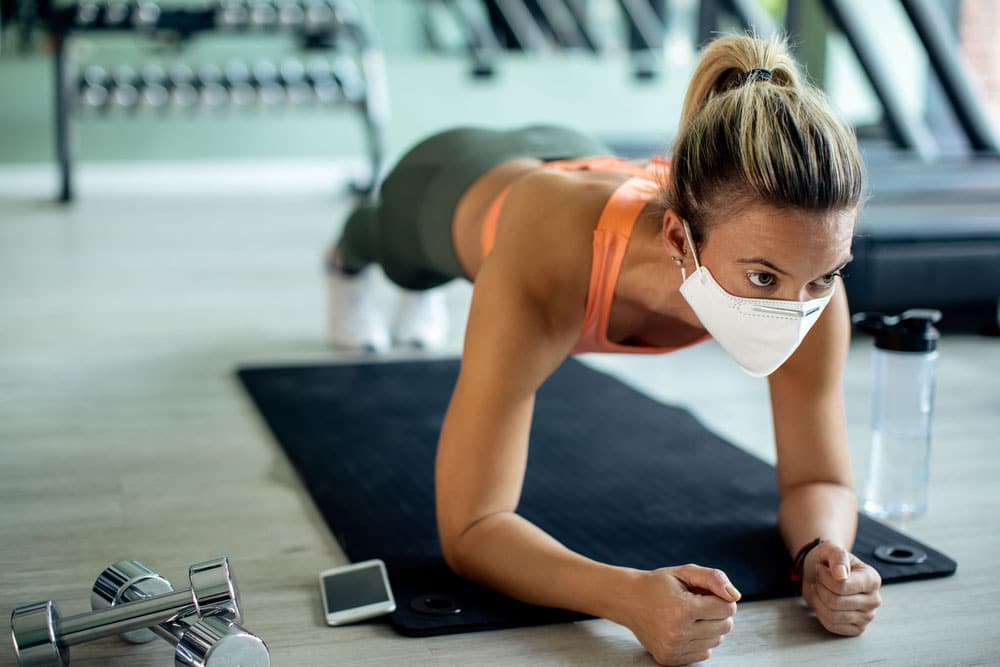With more people wearing masks during the COVID-19 pandemic, you might wonder how doing so affects how well your lungs function when you exercise. One way to slow the spread of COVID-19 is to wear a mask or face covering and many areas are requiring masks if you’re in a public area. Although wearing a simple face-covering doesn’t guarantee you won’t catch the virus, if others around you do the same, it lowers the risk.
Wearing a mask might be inconvenient and a little uncomfortable, but there’s no evidence that wearing one is harmful. But what about covering your nose and mouth with a mask during exercise? When you work out, your heart rate rises and you breathe faster as your body’s oxygen demands increase. Your lungs must suck in enough oxygen to deliver sufficient amounts to your hard-working muscles and tissues. Does wearing a mask make it harder to meet the added oxygen demands of exercise?
How Masks Affect Oxygen Delivery
When you put a mask over your nose and mouth, it may feel a little more difficult to breathe, especially if you aren’t accustomed to wearing one. The discomfort factor is compounded when you launch into a workout. Why might this be? The air you breathe in wearing a mask is warmer and slightly higher in carbon dioxide than the air you inhale without a mask over your face. Although wearing one during exercise may not feel as comfy, there’s no evidence that it is harmful to a healthy person.
How do we know this? According to a recent study published in the Annals of the American Thoracic Society, there’s no evidence wearing a face mask negatively impacts lung function even during vigorous exercise. You might feel like it’s harder to breathe but wearing a mask during a workout minimally affects the amount of oxygen and carbon dioxide that gets into your bloodstream and goes to tissues. As the researchers point out, the difference is so small that it’s often undetectable.
That’s not to say that wearing one during a high-intensity exercise session feels good. When you’re working out at a high intensity, you overheat quickly. Breathing in warmer air while wearing a mask, may feel oppressive. If you’re uncomfortable, you might feel less motivated and not push as hard.
Is age or gender a factor? Research shows wearing a mask doesn’t significantly affect lung function even in older people. Neither males nor females experience a drop in lung function while exercising with a mask on. However, they point out that people with some forms of heart disease and lung problems may have problems exercising with a face-covering since their airways may already have increased resistance to airflow. So, it’s important to talk to your doctor before doing a workout in a mask if you have lung or heart problems.
Should You Wear a Mask During Exercise?
The type of mask you wear doesn’t seem to affect lung function either. In the study, the results were similar with all types of face coverings; none caused a significant decline in oxygen intake. You might subjectively feel like you’re having a harder time breathing, especially during intense exercise, but it shouldn’t significantly alter the amount of oxygen that gets into your bloodstream.
Despite these findings, the World Health Organization still doesn’t recommend that people wear a mask while exercising. Although they don’t reduce oxygen delivery significantly, it feels subjectively harder to breathe and that can impact your workout. Plus, they point out that intense workouts can cause sweat to accumulate beneath the mask, making it easier for organisms that cause infection to grow.
If you work out at home, you may not need to wear a mask, assuming you don’t have guests in your home. That’s an advantage of home workouts! If you exercise at a gym or other public setting, they may require a mask and social distancing.
The Bottom Line
If you’re healthy, wearing a mask during exercise, even vigorous exercise, doesn’t seem to reduce lung function or oxygen delivery. However, that may not hold true if you have lung or heart problems. If that’s the case, it’s better to work out at home, as your risk of developing complications from COVID-19 is higher if you have certain medical issues, like hypertension, type 2 diabetes.
According to the Centers for Disease Control and Prevention, it’s not necessary to wear a mask when you’re outside far away from others, or in your home unless you have visitors. However, some localities have a mask mandate that includes outdoor activities, so follow the guidelines for your state.
The Centers for Disease Control and Prevention states that wearing a mask is one thing we can do to lower the rate of spread of the virus, and the more people that take part, the more everyone’s risk drops. Even a cloth mask has some benefits for reducing the spread of the virus. Plus, wearing a mask may lower your risk of developing other viral infections that circulate in the winter such as seasonal influenza and the common cold.
Make sure you’re getting enough sleep and managing stress too. Lack of sleep and uncontrolled stress causes a rise in cortisol and that suppresses immunity against infection. Take common-sense precautions to lower your risk of infection but keep exercising. Exercise, in moderation, may lower the risk indirectly by enhancing immune function. Stay safe and keep moving!
References:
- ScienceDaily.com, “Masks don’t impair lung function during physical activity, study finds”
- Susan R Hopkins, Paolo B Dominelli, Christopher K Davis, Jordan A. Guenette, Andrew M Luks, Yannick Molgat-Seon, Rui Carlos Sá, A. William Sheel, Erik R Swenson, Michael K Stickland. Facemasks and the Cardiorespiratory Response to Physical Activity in Health and Disease. Annals of the American Thoracic Society, 2020; DOI: 10.1513/AnnalsATS.202008-990CME.
- World Health Organization. “Coronavirus disease (COVID-19) advice for the public: Mythbusters”
- Centers for Disease Control and Prevention. “Use of Masks to Help Slow the Spread of COVID-19”


